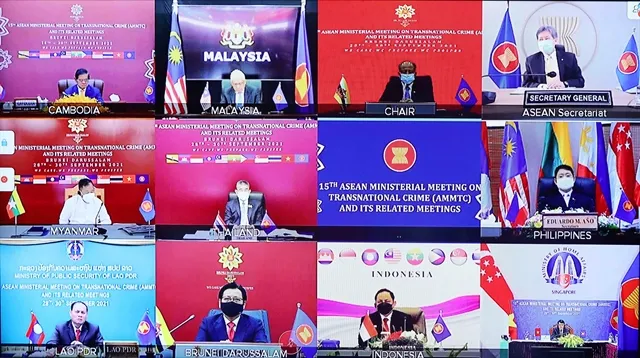
He made the proposal at the 15th ASEAN Ministerial Meeting on Transnational Crimes (AMMTC) and Related Meetings held virtually on Wednesday.
Delivering a report on Việt Nam’s efforts in transnational crime prevention and control since early this year, Deputy Minister Quang highlighted the success of the 14th AMMTC in 2020 which was hosted by the Vietnamese Ministry of Public Security.
At this meeting, the ministry proposed three initiatives to improve the efficiency of transnational crime prevention and control co-operation in the region. The initiatives were recognised by ASEAN member countries in the meeting’s communiqué.
The Vietnamese deputy minister said the pandemic had left a direct impact on the region's joint efforts in preventing and combating transnational crime. Criminals take advantage of cyberspace to commit crimes.
He affirmed that, as an ASEAN member state, Việt Nam is committed to actively and responsibly engaging in ASEAN co-operation in general and collaboration in transnational crime prevention and control.
He proposed countries in the region should continue to maintain and strengthen co-operation on the basis of building political trust in the fight against transnational crime with an aim to deepen, stabilise partnerships and create mutual trust. In particular, in the context of COVID-19’s complicated development, ASEAN countries need to focus their co-operation on border management and cyber security to prevent criminals from taking advantage of the pandemic and increasing activities across borders and in cyberspace.
Relevant sides should set up information channels such as hotlines, online communication mechanisms and improve the efficiency of information exchange and experience sharing in combating transnational crimes, especially information on criminal gangs, methods and complex national security issues of each country, he said.
He also proposed ASEAN countries actively adapt to the "new normal" by organising online training seminars to share experiences in preventing and combating transnational crime, strengthen co-ordination in immigration and consular affairs to facilitate the movement of people for the purposes of work, study, relative visits, and enhance intra-regional exchanges and co-operation through vaccine passports and the "green lane" agreement.
ASEAN countries should encourage partners to support the bloc in providing vaccines and improving vaccine production capacity as well as transferring production technology, he said.
Awang Halbi bin Mohd Yussof, Brunei’s Second Minister of Defence, chairman of 15th AMMTC, said the meeting emphasised the importance of the AMMTC co-operation mechanism, contributing to maintaining peace, stability and development in the region.
He affirmed Brunei Darussalam's commitment to strengthening ASEAN co-operation in preventing and combating transnational crimes, especially terrorism, human trafficking and drug trafficking in the context of the COVID-19 pandemic.
With the theme of the ASEAN Chairmanship Year 2021 “We Care, We Prepare, We Prosper”, Brunei Darussalam will continue to promote its role to lead ASEAN to maintain dialogue, co-operation and timely and effective response to unprecedented challenges, he said.
Public Security officials at the 15th AMMTC reached a conclusion on solutions to realise targets set in the ASEAN action plan on preventing and combating transnational crime during the 2016-25 period.
They adopted the ASEAN Declaration on Preventing and Combating Transnational Crime in the post- pandemic period proposed by the host Brunei.




















